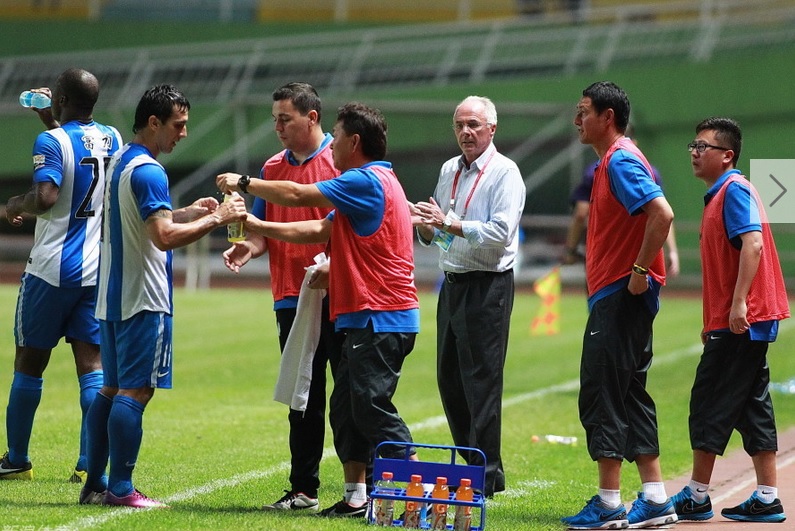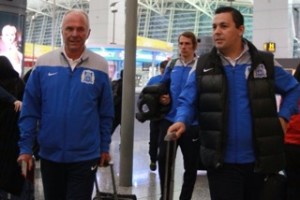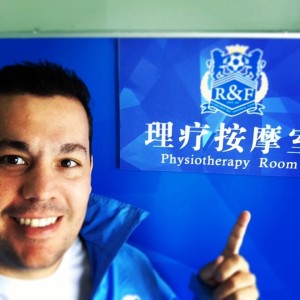The departure of Brazilian manager Sergio Farias from Guangzhou R&F midway through last season saw high-profile former England boss Sven-Goran Eriksson arrive at the Yuexiushan Stadium.
While Farias departed, though, remnants of his backroom staff have remained at the club and continue to work under the Swede, who took R&F up the table to an eventual sixth place finish.
Cleiton Victorino, 30, Brazil joined the club in 2012 under Farias as the club’s head physiotherapist. With a 10-year career in football to his name, Cleiton (third left of main picture) has worked with athletes as part of the Brazil Olympic Committee at the past two Olympic Games in Beijing 2008 and London 2012.
With a Masters degree in the rehabilitation of sports injuries, although he is currently working toward a doctorate, his specialties are physiotherapy, physical preparation and injury prevention.
Wild East Football’s Peter Davis caught up with the Brazilian to talk wet Guangzhou weather, Farias, a new training centre and what it’s like working with a certain Mr. Eriksson.
Cleiton, can you start by telling us the most common injuries you must treat as a physio?
Athletes are subjected to many hours of practice and have a short recovery time; it’s a vicious cycle of training, fatigue, recovery and retraining.
Injuries that commonly keep players out are tears in the knee and ankle injuries, due to the high impact and complex movements that are required as part of being a footballer. When there are tears, the length of the rehabilitation period is based on many factors regarding treatment.
Have you had to deal with any serious injuries in your time at Guangzhou R&F so far?
Unfortunately, injuries are a routine part of contact sports. This last season we had some serious injuries that took place and needed corrective surgery, which increases treatment time, rehabilitation and requires intense physical work.
What is important is that athletes perform everyday tasks to move their rehabilitation forward.
Guangzhou is quite well known for its wet conditions and it must be quite dangerous for the players sometimes. Are injuries related to that quite common?
That’s correct, with Guangzhou being in southern China it has wet and humid weather. To be honest though, over the last three years we did not observe many injuries related to the climate but attribute the cause to the more typical aspects of football.
What kind of effect has Sven’s arrival had on the backroom staff of R&F?
Eriksson has contributed much to all involved at Guangzhou R & F. It is a real honour to work alongside such experienced professionals. He arrived in mid-2013 and made structural changes, introducing different forms of training and making changes all the way down to the diet and accomodation of players.
The goal is always to make the club and players more professional, bring competitive football while balancing the obligations of the players with the rewards. This year the club will be opening a new modern training centre based on a project conceived by the head coach and the coaching staff.
What will that training centre be like? Do you have any details?
The key point is that it will be functional and meet the demand of the players better than the last with new dressing rooms, meeting rooms and a physiotherapy and fitness centre area. It will hopefully be great for the club this season.
How is Guangzhou R&F under Sven compared to under Farias?
I don’t like to make comparisons between professionals for ethical reasons, both coaches are great and boast great past successes. With the arrival of Sven and his extensive experience it was important to have some continuity, but also to understand what was working efficiently and what was not.
Working in the Olympics must have been an experience, what was your role there?
I worked on helping the athletes recover after the competitions they had been involved in and avoiding muscle problems that hinder athletes after a long season. Being at the Olympics with the Brazilian team was a really incredible, fantastic experience!
Who are the leaders in the R&F dressing room? Which players do others look up to?
The team is full of great players, we have players like Jiang Ning, who is currently in the Chinese national side, Davi and, of course, we had Yakubu (now departed, read more here). They are all champions and great professionals.
Check out Wild East Football’s previous look inside Chinese football with Guangzhou Evergrande’s translator Gian Matteo Mannering and Guizhou Renhe assistant manager Bruno Oliveira.
Beijing-based Peter Davis has followed Chinese football since 2008 and is a regular contributor to Wild East Football. He can be found on Twitter and Weibo at @peteydavis.


